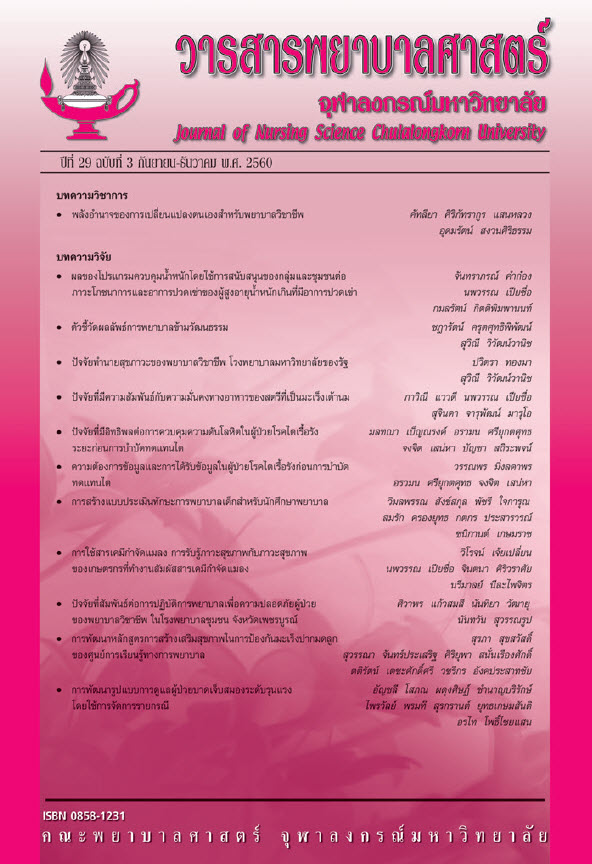Factors Related to Food Security among Women with Breast Cancer
คำสำคัญ:
ปัจจัยที่มีความสัมพันธ์, ความมั่นคงทางอาหาร, สตรีที่เป็นมะเร็งเต้านมบทคัดย่อ
วัตถุประสงค์: เพื่อศึกษา 1) ความมั่นคงทางอาหารของสตรีที่เป็นมะเร็งเต้านม 2) ความสัมพันธ์ของปัจจัยส่วนบุคคลและครอบครัว ปัจจัยระหว่างบุคคลและสิ่งแวดล้อมภายนอก ปัจจัยด้านเวลาและการเปลี่ยนแปลงกับความมั่นคงทางอาหาร และ 3) ความสัมพันธ์ของความมั่นคงทางอาหารกับภาวะสุขภาพ ของสตรีที่เป็นมะเร็งเต้านม
รูปแบบการวิจัย: การวิจัยแบบบรรยายเชิงวิเคราะห์ความสัมพันธ์
วิธีดำเนินการวิจัย: กลุ่มตัวอย่างคือ สตรีที่เป็นมะเร็งเต้านมอายุระหว่าง 20 ถึง 59 ปี จำนวน 197 คน โดยเลือกแบบสะดวกตามเกณฑ์คัดเข้า เก็บรวบรวมข้อมูลโดยให้กลุ่มตัวอย่างตอบแบบสอบถามด้วยตนเอง เครื่องมือในการวิจัยได้แก่ แบบสอบถามข้อมูลทั่วไป แบบสอบถามเกี่ยวกับความมั่นคงทางอาหาร แบบสอบถามแรงสนับสนุนทางสังคม แบบสอบถามภาวะสุขภาพและคุณภาพชีวิต และการประเมินภาวะโภชนาการและความแข็งแรงของกล้ามเนื้อ ข้อมูลถูกวิเคราะห์ด้วยสถิติบรรยาย สถิติสหสัมพันธ์ของ สเปียร์แมน สถิติไคสแควร์
ผลการวิจัย: กลุ่มตัวอย่างส่วนใหญ่มีความมั่นคงทางอาหารไม่ดี โดยมีปัญหาด้านปริมาณอาหารมากที่สุด ตามมาด้วยด้านคุณภาพอาหาร ด้านความวิตกกังวลเรื่องอาหาร ด้านความปลอดภัยของอาหารและด้าน ผลจากมะเร็งเต้านมทั้งในช่วง 1 เดือนและ 1 ปีที่ผ่านมาตามลำดับ ผลการวิเคราะห์ความสัมพันธ์พบว่า ปัจจัยส่วนบุคคลและครอบครัวได้แก่ รายได้มีความสัมพันธ์กับความมั่นคงทางอาหาร (rs= .241, p = .001) ปัจจัยระหว่างบุคคลและสิ่งแวดล้อมภายนอกได้แก่ แรงสนับสนุนทางสังคมจากครอบครัวมีความสัมพันธ์กับความมั่นคงทางอาหารด้านปริมาณอาหาร (rs = -.168, p = .018) ปัจจัยด้านเวลาและการเปลี่ยนแปลงได้แก่ ระยะเวลาการเจ็บป่วยมีความสัมพันธ์กับความมั่นคงทางอาหารด้านความปลอดภัย ของอาหาร (rs = .242, p = .001) นอกจากนี้ยังพบว่าความมั่นคงทางอาหารมีความสัมพันธ์กับทั้งการรับรู้ภาวะสุขภาพ (rs = .294, p < .001) และคุณภาพชีวิต (rs = .258, p < .001)
สรุป: ผลการศึกษาครั้งนี้มีข้อเสนอแนะว่า พยาบาลเวชปฏิบัติชุมชนและทีมสุขภาพควรประเมินการได้ รับการสนับสนุนช่วยเหลือ และติดตามเฝ้าระวังปัญหาความมั่นคงทางอาหารของสตรีที่เป็นมะเร็งเต้านม โดยเฉพาะอย่างยิ่งผู้ที่มีรายได้น้อย และได้รับผลกระทบจากปัญหาสุขภาพอย่างมาก รวมทั้งส่งเสริมแรงสนับสนุนทางสังคมโดยเฉพาะแรงสนับสนุนจากครอบครัว



